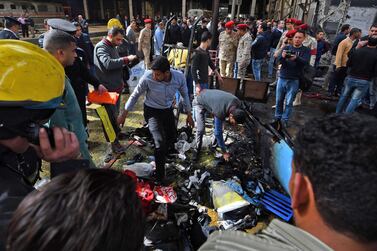Walid Mardi went to work at his busy cafeteria as usual on Wednesday. In his early 40s, Walid makes sandwiches, snacks and hot drinks for passengers passing though Cairo’s Ramses rail station.
But when a runaway train smashed into platform six and the man known by his friends as Al Hajj Walid using an honorific usually reserved for people who have completed a pilgrimage to Makka because of his calm attitude jumped into action.
"I heard a big explosion and later saw the huge flames that reached the ceiling of the station and nearby offices," Walid told The National.
CCTV footage, which has been widely circulated on the news and on social media despite the distressing nature, showed Walid running between people on fire pouring water over their heads and putting out the flames.
“Without thinking, I took the water tank and started pouring water on them. When it didn’t work, I got blankets and tried to put out the fires,” he said.
“Later, the blankets themselves started to burn and I kicked in a nearby kiosk and got more. We were able to save around 13 people,” Walid said, pointing out he hadn’t acted alone.
Eyewitnesses told The National that rail workers, passersby and other passengers all stepped in to try and help the victims before the ambulance and police arrived at the scene.
In total at least 25 people died in the explosion and more than 40 were injured.
“The platform is the place where we make a living. We are always there for the people – even when passengers need directions or assistance with the bags,” he said.
But once the ambulances had rushed the last of the victims away, Walid’s day wasn’t over.
“When the [other] trains continued to operate, we had to stand up and go back to work.”
Egyptians across the country have erupted in praise for Walid and his colleagues, most of whom work for the same catering service working the overnight trains to Aswan and Luxor.
The men have been celebrated as ‘true Egyptians’ and ‘heroes’.
“He is one of the typical courageous Egyptians who steps in to help anyone in their misfortune, even with the least of abilities,” one user said on Twitter.
“Ten bodies were not eaten by fire. Ten lives were not lost. Ten families didn’t collapse. Ten dreams will have another chance to be fulfilled. All because of Walid,” Facebook user Mohamed Ashraf Hammad wrote, referring to the earlier toll of people saved by Walid's act of bravery.
Another user said Walid might be an underpaid and overworked man and maybe he suffers from the same economic problems as many working people in Egypt, but “he didn’t let this affect his humanity”.
Akhbar Al-Youm, one of Egypt’s largest newspapers, dedicated one of its headlines to comparing Walid with Alaa Fathy, the driver of the crashed locomotive. Mr Fathy says he left the engine running when he got out of the cab to argue with a colleague.
The state-owned newspaper described both men as “two different sides to the same coin: negligence and bravery”.
But Walid said he just acted as anyone would.
“I did what I can. I used what God has provided me at the time. There are people whom we could not save, there was a woman and her child deep in the fire who passed away,” he said.
Despite all the praise, Walid says he’s shocked by Wednesday’s incident. “I still cannot process what happened. One of my friends who works in the station is still missing,” he says.





